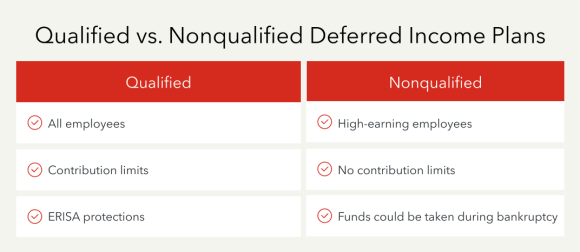Deferred compensation is an agreement where employees can receive a portion of their earned wages at a later date. If you’re an employee of a business, you may be eligible for a deferred compensation plan.
While deferred compensation is optional, these plans can be a convenient way to prepare for the future and save for retirement. There are also tax implications to consider.
Learn more about deferred compensation, how it’s taxed, and whether it’s right for you in this guide.
What is deferred compensation?
Deferred compensation allows employees to agree to receive a portion of their earned wages at a specified later date. For many deferred compensation plans, the specified date is the date of retirement.
Examples of deferred compensation plans include:
Your employer might offer some or all of these deferred compensation plans as part of your benefits package.
If you think you can afford to take advantage of this savings method, it’s worth looking into. Deferring a portion of the wages you’ve earned until your retirement date is a simple way to make sure you have money saved to help you live comfortably in your golden years.
How deferred compensation works
While deferred compensation is a pretty straightforward concept, there are several steps involved.
When you start a new job, your employer should mention any deferred compensation plans that they offer. Depending on your employer, you may be able to sign up for a retirement plan as soon as you start your job, but many have a waiting period, such as 90 days.
Some employers may have additional requirements before you can sign up. For example, you may need to be a certain age or stay with the company for a certain period of time. Once you meet these requirements, you can sign up.
When you sign up for deferred compensation, you can decide:
- How much you want to defer
- How long you’re deferring that money for
- Whether you want to receive your deferred compensation in a lump sum or multiple payments
Once you’ve signed up for a plan, a portion of your wages will automatically be taken out of each paycheck. Depending on the type of plan you choose, your money can grow over time with interest.
In many cases, your employer will match a portion of your contributions to your retirement plan or 401(k). If your employer offers a 401(k) match, you may want to contribute enough to get the maximum match.
You can decide to stop investing in a deferred compensation plan at any point. The money you contributed will remain in the account until you withdraw it.
Some plans may also allow for rollovers. If you’re switching to a new plan or starting with a new employer, you may be able to move your previous 401(k) over to your new 401(k).
Keep in mind that every plan is different. Your employer can decide what type of plan(s) they want to offer, how much they want to match, and more.
Types of deferred compensation plans
There are two primary types of deferred compensation plans: nonqualified and qualified plans. Nonqualified deferred compensation (NQDC) plans are also called Section 409A plans.
In terms of NQDC plans, there are a handful of plans to choose from:
- Bonus deferral plans: When you receive a bonus as an employee, you can choose to receive your bonus (and have it taxed) at a later date.
- Excess benefit plans: Excess benefit plans allow you to contribute more to your qualified benefit plan.
- Salary reduction arrangements: With a salary reduction agreement, or deferred salary, you can delay a portion of your salary to another year. For example, you can choose to defer $20,000 to next year if you have a salary of $100,000.
- Supplemental Executive Retirement Plans (SERPs): SERPs are typically offered to executives and other higher-level employees. Employers can contribute nonqualified funds to a SERP that you can access once you retire.
There are also qualified deferred compensation plans outlined in the Employee Retirement Income Security Act of 1974 (ERISA). 401(k) and 403(b) plans are examples of qualified deferred compensation plans.
Qualified deferred compensation plans have contribution limits, and only employees can sign up for these qualified plans. Keogh plans and SEP IRAs are also examples of qualified deferred compensation plans.

Nonqualified deferred compensation plans vs. 401(k)
While there are some similarities between qualified and nonqualified plans, there are a few key differences. Let’s take a closer look at what separates nonqualified plans from traditional plans like a 401(k).
Nonqualified plans have no contribution limits, which means your employer can contribute as much as they want to. 401(k) plans and other qualified plans have set contribution limits that renew each year.
Qualified deferred compensation plans are elective, which means employees can choose whether they want to contribute. Employers can decide whether nonqualified plans are elective or nonelective, giving them more control over how employees are compensated.
Traditional retirement plans are reserved for employees, but that’s not the case when it comes to nonqualified plans. Employers can offer nonqualified deferred compensation to independent contractors, which helps them attract top talent.

The terms of your retirement plan may be set in stone, but you can negotiate the terms of a nonqualified plan. You and your employer can decide:
- How much you’re contributing
- When you can withdraw
- How you’ll receive your payment
Keep in mind that every plan is different, so it’s your job to look at the terms and find a plan that fits your needs. Think about your retirement goals, your monthly budget, and the employer match when you’re choosing a plan and deciding how much to contribute.
Pros and cons of deferred compensation
Deferred compensation plans can be a great way to save for the future, but there are some potential downsides. Consider these pros and cons to decide if it’s right for you.
Pro: Convenient savings option
If you’re having trouble building a savings account or planning for retirement, deferred compensation is a simple way to save. Money is automatically withheld from each paycheck, so you can watch your savings grow once you’re set up.
Pro: Flexibility
While deferred compensation is commonly used for retirement, it has other uses. You and your employer can work together to decide when you receive your funds so you can plan for the future, knowing you’ll have access to your savings.
Con: Risk for losses in case of bankruptcy
In some cases, nonqualified deferred compensation plans come with more risk. If a company goes bankrupt, your deferred compensation funds may be lost in the process. Some companies also require that you stay with the company until retirement.
Con: Investment limitations
Unlike other plans, deferred compensation funds are usually invested in company stock. That means your money can fluctuate with the changing value of the company, and you don’t have the freedom to decide how to invest your money.
Before you sign up for deferred compensation or any retirement plan, consider speaking with a financial advisor. An advisor can give you personalized guidance based on your financial situation and your retirement goals.

Tax implications of deferred compensation
Contributing to a deferred compensation plan will affect your federal taxes because you’re not paying taxes on income you defer. We’ll outline all the tax implications of deferred compensation plans to help you determine whether this is the right savings strategy for you.
At what point you pay taxes on deferred compensation will depend on what kind of plan you have.
When you defer a portion of your salary, you don’t have to pay taxes on that deferred money until you receive it unless you’re enrolled in a Roth plan. This helps you build your savings faster than you could by contributing post-tax dollars.
When you receive your deferred compensation funds — usually at retirement — you’ll have to pay taxes on that payout. Deferred income is taxed as regular income, which means the rate depends on the amount you receive.
If you want to pay a lower tax rate when you receive your deferred compensation, consider an installment plan, where you’ll receive smaller portions of the total deferred income spread out over time instead of one lump sum.
How deferred compensation is paid out
You and your employer can work together to figure out when your deferred compensation will be paid out. You can receive your funds in one lump sum or several smaller installments.
Deferred compensation plans are commonly paid out at retirement. Once you retire from a company, you can receive your funds in a single payment or spread payments across several years.
You can also choose to defer compensation for a shorter period. For example, you can defer income for 10 years or until you reach a certain age.
If you want to learn more about deferred compensation plans and how you can get started, reach out to your employer or consider consulting a financial advisor.
No matter what moves you made last year, TurboTax will make them count on your taxes. Whether you want to do your taxes yourself or have a TurboTax expert file for you, we’ll make sure you get every dollar you deserve and your biggest possible refund – guaranteed.







